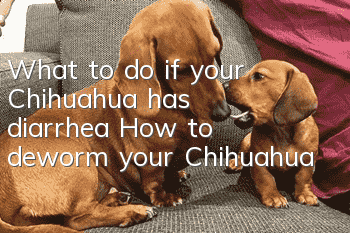What to do if your Chihuahua has diarrhea? How to deworm your Chihuahua

When Chihuahuas are 2 to 3 months old, they will have diarrhea, which is commonly known as "turning their intestines". This has nothing to do with the folklore of "eating salty", but endoparasitic enteritis. Usually caused by roundworms, hookworms, tapeworms, and also coccidia. Because the intestinal cavity of puppies is thin, parasites such as roundworms are relatively abundant. And they are large, causing diarrhea in puppies. Weight loss, and in severe cases, even vomiting worms. Eggs can also be found in feces. Some puppies may develop small intestinal intussusception or anal prolapse.
Anthelmintics can be used to drive away parasites in puppies. Commonly used albendazole and levamisole are taken orally. The dosage is 1 tablet per 5 kilograms of weight, once a day for 3 consecutive days. They are effective against roundworms, pinworms and hookworms. Mebendazole is effective against roundworms, pinworms, hookworms, whipworms and nematodes. Compound mebendazole (quick-acting intestinal insecticide) is made from a combination of mebendazole and levamisole hydrochloride. Take 2 tablets per meal. When a dog has blood in the stool, the reason is unclear. Praziquantel can treat tapeworm infection, 10 to 20 mg per kilogram of body weight can be taken orally once. For anti-trichomoniasis, you can choose metronidazole. Sulfa drugs can only treat coccidial infections, but amprolium hydrochloride can also be used.
Since puppies often lick soil, walls, and excrement of other dogs when they can walk, they are infected with parasites. Therefore, regular deworming is necessary starting from puppies.
- How much does it cost to have a Chow Chow beauty treatment?
- How to Get Rid of Dog Bad Breath
- Does your normally obedient dog suddenly urinate? It may be caused by these 5 reasons!
- Can dogs eat eggs after giving birth?
- When traveling long distances with your pet, a pet first aid kit is a must-have
- What are the skills you must master when choosing a Chihuahua?
- Why is the dog’s urethra red, swollen and bleeding?
- Are all dog colds caused by canine distemper?
- Reject hormone products, a complete guide to dog development
- How to treat a Doberman pinscher that is vomiting and lacks energy?



